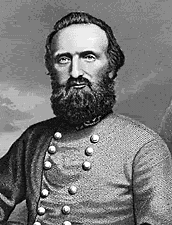


Jackson, Stonewall (1824-1863), was one of the most famous Confederate generals and one of the best officers who fought under General Robert E. Lee. At the First Battle of Bull Run, or Manassas, Jackson's brigade faced overwhelming odds, but formed a strong line and held its ground. General Barnard E. Bee, trying to rally his Southern troops, saw Jackson's line and shouted, "There is Jackson standing like a stone wall. Rally behind the Virginians!" After that, Jackson was known as "Stonewall," and his brigade as the Stonewall Brigade.
Jackson's chief characteristics were his religious nature, his careful attention to military detail, his firm discipline, and his capacity to get the maximum efforts from his men. His soldiers loved him and trusted his ability, and so they tolerated his strict discipline.
Generals Lee and Jackson understood each other perfectly. The two worked so well together that General Lee could not find a man capable of replacing Jackson after his death.
Early career. Thomas Jackson was born in Clarksburg, Virginia (now
West Virginia), on Jan. 21
As soon as he received his commission as a lieutenant of artillery, Jackson was assigned to the war zone in Mexico. There he first met Robert E. Lee. Jackson served at Veracruz, Contreras, Chapultepec, and Mexico City, and rose to the temporary rank of major within a year.
After the Mexican War ended, Jackson served at various forts. In 1850, his company went to Florida to fight the Seminole Indians. Jackson left the army in 1851 and joined the faculty of the Virginia Military Institute at Lexington, where he taught until 1861. He was not popular as a teacher, and the students mocked his apparently stern, religious nature and his eccentric traits. In 1853, he married Elinor Junkin, who died the next year. In 1857, he married Mary Anna Morrison.
Although he favored preservation of the Union, Jackson went with his state, Virginia, when it seceded. An unknown when the war started, he soon made a reputation in the First Battle of Bull Run. In the Shenandoah Valley in 1862, Jackson earned international fame. With not more than 17,000 men, he defeated 60,000 Union troops in a series of lightning marches and brilliant battles. After the campaign ended in June, Jackson raced to the aid of Lee at Richmond. He fought in the Seven Days' Battles, and at Cedar Mountain, the Second Battle of Bull Run, Antietam (Sharpsburg), and Fredericksburg.
Tragic death. Jackson fought his greatest battle in May 1863. He took
his Second Corps around Union forces near Chancellorsville, Virginia. Jackson's
men struck from behind and drove the enemy back in wild disorder. At nightfall,
Jackson went ahead of the line to scout. In the darkness, some of his own men
mistook him for the enemy and shot him. As Jackson lay wounded, doctors
amputated his left arm. Lee remarked: "He has lost his left arm; but I have
lost my right arm." Jackson died of pneumonia on May 10
Jackson was buried at Lexington, Virginia. He was elected to the Hall of Fame for Great Americans in 1955.

 Home
Home